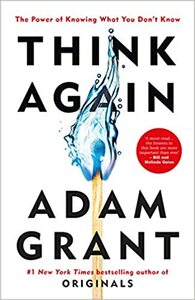Take a photo of a barcode or cover
This book was very entertaining and provided a lot of profound insight into the importance of thinking and re-thinking. The writing is sophisticated but completely relatable - and is chock full of strategies for employing this mindset in everyday life. I found the tips at the end extremely helpful. Highly recommend if you are looking to change the way you think and how you interact with other people.
informative
inspiring
reflective
medium-paced
challenging
informative
reflective
fast-paced
Something to come back to again and again.
While I completely agree with concept of being open to new ideas and information, the vehicle for this message missed the mark. Tried too hard to be funny in some places, and tried too hard to be woke in others.
informative
lighthearted
reflective
medium-paced
every single person on planet earth should read this book!! and lucky for us, this book is written to be digestible for nearly every person on planet earth!! it is such a great starting point for learning how to think differently before digging into denser books on topics you might want to learn more about.
in our dumpster fire of a world right now, everything is divisive, political, and inflammatory. now more than ever, we need to be able to think critically and have complex conversations with each other. but if we remain insistent on equating our ideologies with our identities, we are never going to be able to discuss opposing ideas with one another without feeling personally attacked. and then we might as well roast s’mores over the aforementioned dumpster fire instead of putting it out.
with a great balance of anecdotes and case studies that keep the book both informative and enjoyable, Adam Grant does an incredible job of teaching us how to shift from “persecuting, preaching, and politicking” our beliefs to being scientific about them. if we can be open to rethinking our own beliefs, seeking evidence and critical feedback when forming new ones, and finding the joy in being wrong, we can grow as both individuals and a collective.
open dialogue is where change happens, but if we’re too scared to talk to each other, can’t talk without it leading to full out war, or cling so desperately to our beliefs that we refuse to talk at all, we’re gonna be at a standstill forever. so, again, s’mores.
i only have a few critiques for the book tbh. it obviously leans a bit utopian but i think it’s gotta be to keep it as succinct as it is, so just do what the book is teaching you and use your brain when reading it. it can also be a bit repetitive but for the sake of ingraining an idea, i can forgive it.
tldr; read the book!!! and let’s all be more open with ourselves and each other. <3
in our dumpster fire of a world right now, everything is divisive, political, and inflammatory. now more than ever, we need to be able to think critically and have complex conversations with each other. but if we remain insistent on equating our ideologies with our identities, we are never going to be able to discuss opposing ideas with one another without feeling personally attacked. and then we might as well roast s’mores over the aforementioned dumpster fire instead of putting it out.
with a great balance of anecdotes and case studies that keep the book both informative and enjoyable, Adam Grant does an incredible job of teaching us how to shift from “persecuting, preaching, and politicking” our beliefs to being scientific about them. if we can be open to rethinking our own beliefs, seeking evidence and critical feedback when forming new ones, and finding the joy in being wrong, we can grow as both individuals and a collective.
open dialogue is where change happens, but if we’re too scared to talk to each other, can’t talk without it leading to full out war, or cling so desperately to our beliefs that we refuse to talk at all, we’re gonna be at a standstill forever. so, again, s’mores.
i only have a few critiques for the book tbh. it obviously leans a bit utopian but i think it’s gotta be to keep it as succinct as it is, so just do what the book is teaching you and use your brain when reading it. it can also be a bit repetitive but for the sake of ingraining an idea, i can forgive it.
tldr; read the book!!! and let’s all be more open with ourselves and each other. <3
inspiring
The author tells us essentially to remain curious, questioning, and perpetually learning. And he tries to take down the perception that the best way to be heard is to project confidence (even if you don't have it). Being open-minded gives room for others to contribute (or to may part of an idea their own). That's good, right? It's certainly more fun to operate that way.
Read this one, particularly if you've not read anything from Grant before.
Many of the examples in here are geared to the workplace. But they definitely apply in other situations as well - home, volunteering, or really anywhere you solve problems, and collaborate with others. I say this because I have an odd reaction now to workplace books (being in my post-working for money life), as in I might initially dismiss what they have to say.
Read this one, particularly if you've not read anything from Grant before.
Many of the examples in here are geared to the workplace. But they definitely apply in other situations as well - home, volunteering, or really anywhere you solve problems, and collaborate with others. I say this because I have an odd reaction now to workplace books (being in my post-working for money life), as in I might initially dismiss what they have to say.
informative
inspiring
reflective
medium-paced
challenging
hopeful
informative
inspiring
lighthearted
medium-paced
A more anecdotal, approachable take on Kahneman's "Thinking Fast and Slow", I am walking away from this book with a number of interesting takeaways that perhaps offer practical examples of how to embrace "Thinking Slow"
- Learn to Love Being Wrong - this is a similar message to the one in 'Superforecasters' (which he also quotes). People who learn are the ones who love to learn - and these are the same people who love discovering that their previous assumptions about the world were wrong. Having a model of the world is good - it makes so many of our day to day decisions easier (thinking fast). However, the people who have useful models are not the ones who embrace conviction, but those who embrace curiosity.
- Listen to Others - Grant presents this as a debate winning technique (it is), but it's also a natural outgrowth of #1 above. The nice thing is that when we approach others with curiosity rather than conviction, they also have room to embrace curiosity, and to be (and feel) seen by us as we explore how they came to conclusions that have probably made perfect sense in their context, but which may not be optimal (even in their current context).
- Create Curious Cultures - again this, is an outgrowth of 1 and 2 above. As we model curiosity and make it safe for others, we can also start identifying the questions that will be helpful to ask in each context, and practice and explore ways to move from fast thinking to slow thinking.
As a thought on #3 above - I think it's worth noting that we've developed 'fast' thinking for a reason. Sometimes we do understand a context, there is urgency, and we can't just sit there pondering the universe forever. There is a healthy balance between curiosity and action that he isn't specifically exploring here, but that seems worthy of its own time. At the same time, I love his callout of the firefighters in section 1, where in the middle of an emergency, the correct action was NOT to just keep doing what you've always done, because it very clearly wasn't going to work. Developing the habit of evaluating where we are in the balance of fast vs slow thinking requirements needn't stop us from fast thinking - but if we find that we are consistently getting poor results, perhaps that's a reason to slow down and re-evaluate.
(As a side note: I listened to this book, but then purchased it and discovered that I had missed any number of excellent charts and graphics. It is well worth finding a hard copy to enjoy those.)
(As a side note: I listened to this book, but then purchased it and discovered that I had missed any number of excellent charts and graphics. It is well worth finding a hard copy to enjoy those.)





